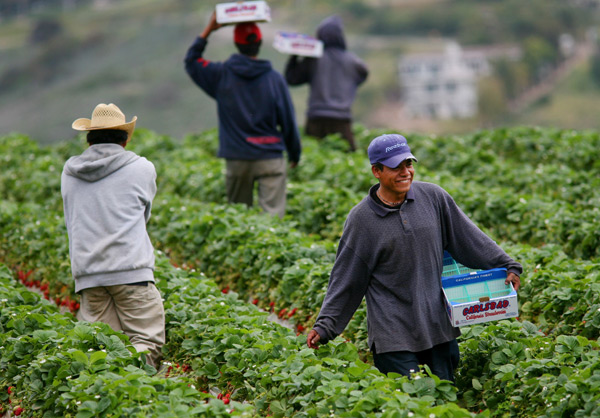The Partnership for a New American Economy has released a new report that reveals how the rapidly declining number of field and crop laborers available to farms is hurting both farmers and the U.S. economy.
 This drop in migrant farm labor over the past decade has created a severe labor shortage in many key parts of the country vital to American farmers and staple crops. It has also had an impact far beyond rural America: The lack of workers has not only hurt the ability of U.S. farms to grow and expand, it has cost our economy tens of thousands of jobs in related industries like trucking, marketing, and equipment manufacturing.
This drop in migrant farm labor over the past decade has created a severe labor shortage in many key parts of the country vital to American farmers and staple crops. It has also had an impact far beyond rural America: The lack of workers has not only hurt the ability of U.S. farms to grow and expand, it has cost our economy tens of thousands of jobs in related industries like trucking, marketing, and equipment manufacturing.
Findings in the report include:
- The supply of workers available to U.S. farmers has been rapidly declining. Between 2002 and 2014, the number of full-time equivalent field and crop workers has dropped by at least 146,000 people, or by more than 20 percent. Wage patterns indicate that this caused a major labor shortage on U.S. farms.
- The labor shortage has hurt our country’s ability to produce labor-intensive fruits, vegetables, and tree nuts. Had labor shortages not been an issue, production of these crops could have been higher by about $3.1 billion a year.
- The number of potential farm workers immigrating to the United States has greatly slowed over the last decade. Between 2002 and 2012, the number of new field and crop workers immigrating to the United States fell by roughly 75 percent. This led to a drop in the number of entry-level workers available for difficult jobs like hoeing, harvesting, and planting.
- Some parts of the country were particularly hard hit by the recent labor decline. The number of full-time equivalent field and crop workers in California declined by about 85,000 people between 2002 and 2014. Alabama, Georgia, and South Carolina lost about 8,500 workers total, or more than one in four of the crop workers employed in 2002. Colorado, Nevada, and Utah lost 36.7 percent of their full-time equivalent field workforce, or 7,029 people.
- U.S.-born workers are not filling labor gaps on American farms. From 2002 to 2014, the increase in U.S.-born workers offset less than three percent of the dramatic decline in field and crop workers on U.S. farms caused by dwindling foreign-born workers.
Latinos Post also writes about the new report and emphasizes the role and impact of Latino laborers.
Farmworkers long-time concern of Catholic Rural Life
Ethical agriculture is not only how we grow food, but how we treat those who bring food to our tables. Catholic teaching about the dignity of work informs us that farm workers must be able to support themselves and their families through their work.
This also means that agricultural workers must be able to survive the risks associated with field work and food processing lines. Over many decades, Catholic Rural Life has borne witness to the great pain and stress experienced when a laborer works long days in the field or inside meat/poultry processing factories.
Farm workers have also been a critical concern of the U.S. Conference of Catholic Bishops. In Catholic Reflections on Food, Farmers and Farmworkers (2003), they renewed their commitment to lift up the situation of agricultural workers and to work to improve their lives and those of their families. Farmworkers are among the most vulnerable and exploited people in our land. Their situation demands a response from people of faith.
















